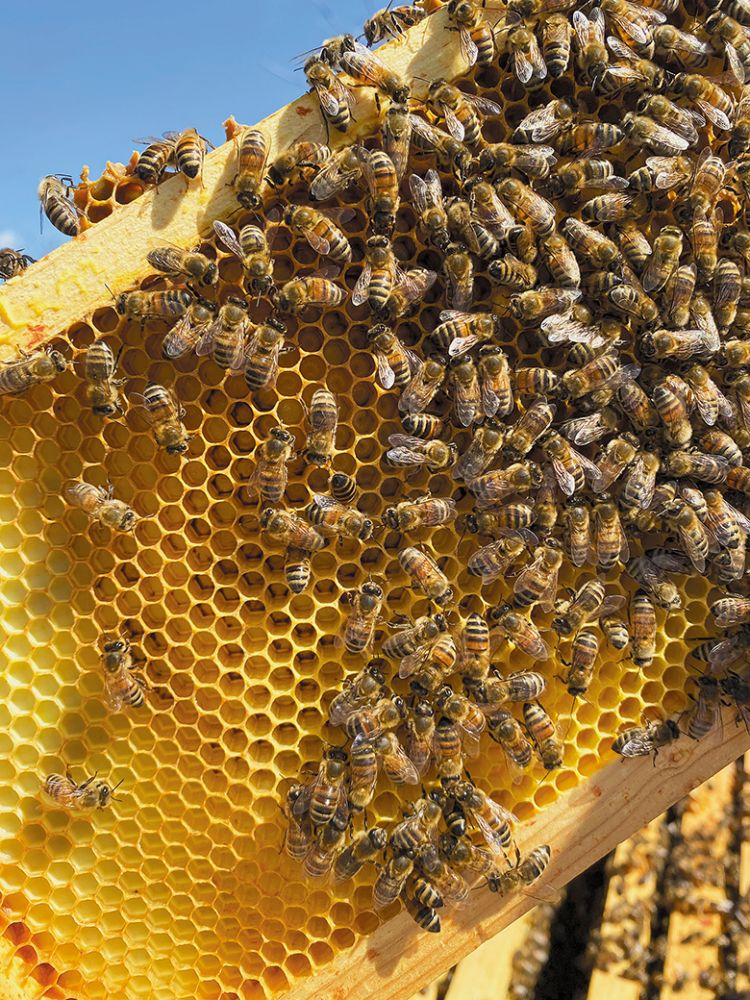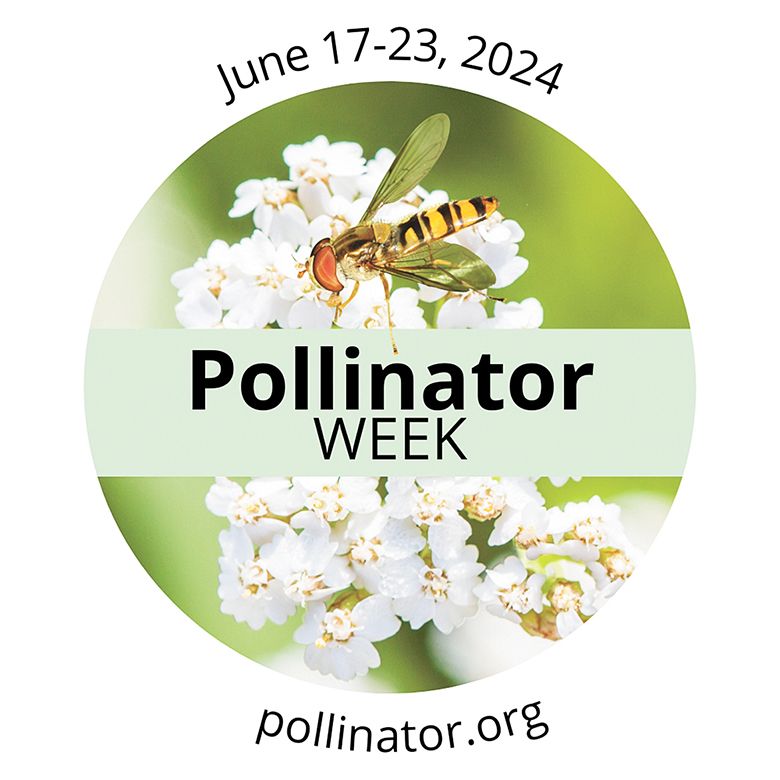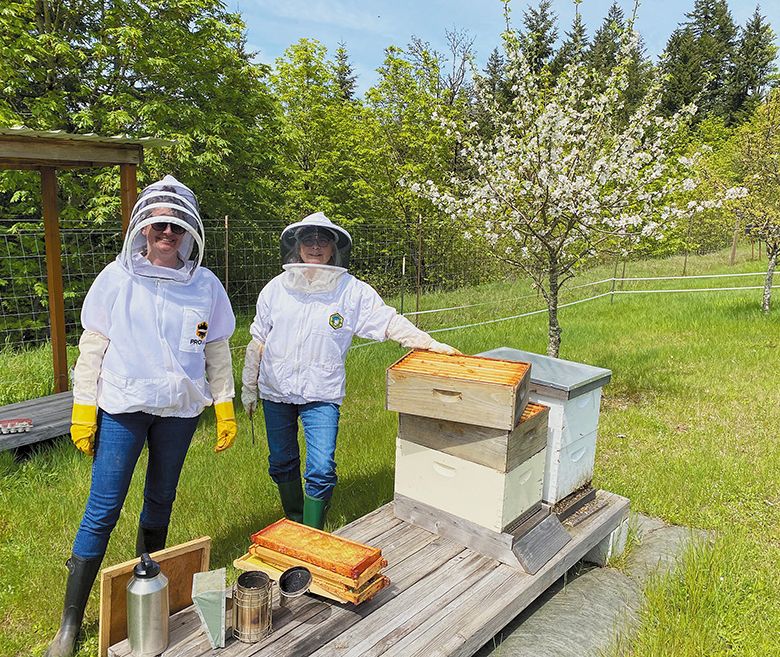Protecting Pollinators
Oregon wineries increase bee populations with help from OSU and other organizations



By Patty Mamula
June 17– 23 marks Pollinator Week. Oregon wineries, with their deep respect for sustainability, protect pollinators all year long.
Several years ago, six wineries joined the Oregon Bee Project, coordinated by Oregon State University, or OSU, Extension Service. According to Andony Melathopoulos, OSU pollinator health professor, the project developed in consultation with the wineries. Since then, almost 20 more have joined.
To participate, a winery must document 50 plants on their property within one year. Melathopoulos said, “They submit plant photos, then we use iNaturalist, a biodiversity app, to aggregate the plants contained within their property.”
By comparing the selected plants with Oregon Bee Atlas, a comprehensive inventory of Oregon’s native bees and their plant-host preferences, OSU determines which might be missing.
“We hope this becomes a long-term project and wineries continue collecting information. With more precise estimates of desired plant quantities and preferred locations, we learn which bees are in these vineyards. We want to continue to grow our knowledge,” Melathopoulos said.
“Oregon is already ahead of the world for bee conservation,” he said. “And we welcome more winery participation.”
A dual aspect of the project involves educating the public during wine tours by highlighting four central areas: beekeeping, mason bees, bee biodiversity and planting for bees. For information on the tours, visit oregonbeeproject.org/winetour.
Last summer, through the Oregon Bee Project inventory, Fairsing Vineyard discovered there were 75 bee species on its 200 acres. The family-owned winery eagerly welcomed plant recommendations that would increase diversity. Fairsing’s general manager, Meara Butler, explained how they usually plant crimson clover, an excellent food source for bees, near the vineyards. Both Butler and her mother, owner Mary Ann McNally, are beekeepers. “We have had as many as six hives during a really good summer,” she said. “Usually, we have three or four.”
They also maintain mason bee houses, ten in all, around the perimeter of the property. Craig Watts cares for these, removing the hollow tubes each winter to keep them safe and clean.
The lack of pesticides attracts other pollinators to the Yamhill property, including hummingbirds, butterflies and moths.
On June 21, Fairsing will host Bee Friendly Friday from 5–8 p.m. The evening, devoted to bee education, will include information on how to keep bees at home. Led by OSU Master Beekeepers and Melittologists (insect experts with a focus on bees), they will recommend tips on plantings and species that attract pollinators. Butler and McNally will discuss the honey and mason bees on their property. Make reservations at www.fairsingvineyard.com/events.
Montinore Estate’s tasting room plans to highlight Pollinator Week with free bee-friendly seed packets for guests, along with information about the various bee species found on the property and which plants they find attractive.
At Youngberg Hill Winery in McMinnville, owner Nicolette Bailey describes herself as a junior beekeeper. “In eight years, I haven’t been very successful,” she said. Ready to give up, she received encouraging advice in year three from Nick Van Calcar in Amity, a fifth-generation beekeeper. He defined the worst beekeeper as the one who stops trying. So she continues. “I do bees for those who can’t,” she said.
Bailey finds motivation by talking with experienced beekeepers. “What you learn in the classroom doesn’t always work. I have had to make a few adjustments because the eight and 10 frame hives are too heavy,” Bailey said. She usually oversees three hives on the property. Residents of two wintered over last year.
Vineyards don’t technically require bees since they are self-pollinating, and Youngberg Hill’s 50 acres, farmed biodynamically, already support biodiversity. Still, Bailey continues with the bees to promote pollinators everywhere.
As part of the Oregon Bee Project and, in celebration of Pollinator Week, Youngberg Hill is hosting an event from 10 a.m. – 1 p.m. Saturday, June 8. “We will walk through our biodynamic vineyard and share our sustainable farming practices and the importance of bees in vineyard management,” Bailey said. The tour includes a visit to the beehives and concludes in the tasting room with a honey mimosa paired with a honey-topped crostini. Sign up at www.exploretock.com/youngberghill/event/475005/youngberg-hill-biodynamic-bee-tour.
Bailey also plans a butterfly sanctuary this fall. “I want thousands of places for the monarchs to stop when migrating from Mexico,” she said. Her plan includes developing do-it-yourself information accessible with a QR code.
Bailey said, “We’ve called this beautiful place home for 20 years. My goal was to raise a family in a natural environment. I feel a responsibility and commitment to care for this property.”
Abbott Claim Vineyard is part of the Beck Family Estates, a family-owned company devoted to conservation, regenerative farming and restoration. Viticulturist Heath Payne described how they are in the planning phase of developing a habitat for monarch butterflies.
The 170-acre property contains 30 acres of grapevines. Payne said, “We chose not to cultivate honeybees, instead adopting a more complex, diverse approach to pollinators.” A few years ago, they began working with OSU and its Pollinator Health Program. OSU introduced Payne to the Pollinator Partnership in California, which, in turn, was approached by Monarch Wings Over America.
“A small group of wineries have dedicated more than 1,000 acres with new species that supply both food and larvae habitat. The majority of us are situated on the Savannah Ridge, a unique east/west ridgeline in Yamhill Carlton,” said Payne.
“The Pollinator Partnership is taking an inventory of our property to determine existing species. They will use this information to develop a habitat program with new plantings between spring and fall of this year,” said Payne. Once planted, the specific areas will be maintained and constantly monitored.
Soter Vineyards in Carlton was one of the original participants in the Oregon Bee Project. Julia Bandy, director of consumer sales and marketing, said biodiversity is a priority on the 250-acre Mineral Springs Ranch. “Surrounding the 50-acre vineyard are untouched pockets, encouraging biodiversity through native plants and insects,” she said.
As part of the project, OSU established PVC pipe traps to count and track different bee species. The subsequent report identified which plants were bee-friendly, current pollinator species counts, which were “super bee plants” and where they were located. It included native plant recommendations for increasing the species of bees to 91. “In early March, we planted 400 additional native plants, including serviceberry, red-flowering currant and thimbleberry around the tasting room and forest south of our vineyard,” said Bandy.
In addition to wild bees, there are three honeybee hives on the property, maintained by Bandy’s beekeeping father. In August, Soter will host a hiking tour of the ranch, including the hives, for guests wanting further information about their vineyard and sustainable practices. Led by Jeff Peterson, a wine educator and former Linfield professor, Melathopoulos also will answer questions. “We’re excited to get people into all aspects of our property,” said Bandy.
Melathopoulos never doubted that Oregon wineries would be trailblazers in bee conservation because of our wine industry’s entrenched record of respecting and preserving the land.
Patty Mamula is a Portland-based freelance writer focusing on Northwest art, entertainment and culture. Her résumé includes Sunriver Magazine, The Capital Press and other publications. Connect with her at pattymamula@gmail.com.










